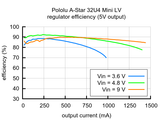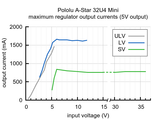

The A-Star 32U4 Mini LV is a programmable module based on the ATmega32U4 from Atmel. Unlike competing products, it has an onboard switching step-up/step-down regulator that allows it to be powered efficiently from a 2.7 V to 11.8 V supply. This compact 1.9″ × 0.7″ board breaks out all 26 of the microcontroller’s I/O pins (of which 7 can be used as PWM outputs and 12 as analog inputs), and loading programs is made easier by a Micro-USB interface and a preloaded Arduino-compatible bootloader.
Overview
The Pololu A-Star 32U4 Mini boards are general-purpose programmable modules based on Atmel’s ATmega32U4 AVR microcontroller, which has 32 KB of flash program memory, 2.5 KB of RAM, and built-in USB functionality. The A-Star (abbreviated A*) adds a number of onboard features to support the microcontroller and make it easier to work with, including a 16 MHz crystal, a USB Micro-B connector, an in-system programming (ISP) header, a reset button, and three indicator LEDs.
Each A-Star 32U4 Mini contains a switching regulator that efficiently produces 5 V from an external voltage source to power the microcontroller. Three different versions are available, covering a wide range of input voltages:
- A-Star 32U4 Mini ULV: 0.5 V to 5.5 V
- A-Star 32U4 Mini LV: 2.7 V to 11.8 V
- A-Star 32U4 Mini SV: 5 V to 36 V
A robust power selection circuit enables seamless transitions between regulator power and USB power, and overcurrent and reverse-voltage protection help safeguard the board against accidental damage.
All 26 general-purpose I/O lines on the ATmega32U4 are accessible on the A* 32U4 Mini; 7 of these are usable as PWM outputs and 12 are usable as analog inputs. The board measures 1.9″ × 0.7″, the same size as an Arduino Micro, and features a pair of mounting holes sized for #2 or M2 screws (not included). Its 0.1″ pin spacing makes the A* easy to use with solderless breadboards, perfboards, and 0.1″-pitch connectors.
This product requires a USB A to Micro-B cable (not included) to connect to a computer.
Features
- Dimensions: 1.9″ × 0.7″ (1.95″ × 0.7″ including USB Micro-B connector)
- Programmable 16 MHz Atmel ATmega32U4 AVR microcontroller
- 32 KB flash (4 KB used by bootloader, leaving 28 KB available for user program by default)
- 2.5 KB SRAM
- 1 KB EEPROM
- Native full-speed USB (12 Mbps)
- Preloaded with Arduino-compatible bootloader (no external programmer required)
- All I/O lines from the ATmega32U4 broken out in a compact package
- 26 general-purpose I/O pins available along the sides of the board
- 7 pins can be configured as hardware PWM outputs
- 12 pins can be configured as analog inputs
- 3 user-controllable LEDs
- Reset button
- Can be powered from USB or from an external source:
- ULV: 0.5 V to 5.5 V
- LV: 2.7 V to 11.8 V
- SV: 5 V to 36 V
- Switching regulator enables efficient operation
- Power selection circuit allows for seamless switching between power sources and provides overcurrent protection
- Reverse-voltage protection on external power inputs
- Precision 16 MHz crystal
- 6-pin ISP header for use with an external programmer
- Comprehensive user’s guide
Details for item #3103
This version, the A-Star Mini LV, can be powered from a 2.7 V to 11.8 V external source. The input voltage is regulated to 5 V by a TPS63061 switching step-up/step-down (buck-boost) converter from Texas Instruments. (We also make a standalone regulator based on this integrated circuit.)
The regulator’s flexibility in input voltage is especially well-suited for battery-powered applications in which the battery voltage begins above 5 V and drops below 5 V as the battery discharges. Without the typical restriction on the battery voltage staying above 5 V throughout its life, a wider range of battery types can be considered. For example:
- A 4-cell battery holder, which might have a 6 V output with fresh alkalines or a 4.0 V output with partially discharged NiMH cells, can be used to power this A*.
- A disposable 9 V battery powering the board can be discharged to under 3 V instead of cutting out at 6 V, as with typical linear or step-down regulators.
As shown in the left graph below, the LV’s switching regulator has an efficiency – defined as (Power out)/(Power in) – of 80% to 90% for most combinations of input voltage and load.
|
|
The A-Star’s components, including the microcontroller and LEDs, draw 30 mA to 40 mA in typical applications. The rest of the regulator’s achievable output current, which depends on input voltage as well as ambient conditions, can be used to power other devices. The right graph above shows output currents at which the voltage regulator’s over-temperature protection typically kicks in after a few seconds. These currents represent the limit of the regulator’s capability and cannot be sustained for long periods; a good estimate for the maximum continuous regulator output current is 60% to 70% of the values shown in the graph.
Arduino compatibility
The A-Star 32U4 ships with a preloaded Arduino-compatible bootloader (which uses 4 KB of flash memory, leaving 28 KB available for the user program). We provide a software add-on that enables the board to be easily programmed from the Arduino environment.
The A-Star 32U4 Mini boards use the same microcontroller as the Arduino Leonardo and Arduino Micro and run at the same frequency, and they are the same size as the Arduino Micro, but they offer a number of advantages over these other ATmega32U4-based boards. Most notably, their efficient switching regulators cover a wide range of input voltages, opening up new possibilities for powering projects built around Arduino-compatible microcontroller boards. Another advantage is the power selection circuit based on the TPS2113A power multiplexer from Texas Instruments, which allows safe, seamless power switching between USB and an external source without losses from passive components like fuses or diodes along with the ability to monitor and control the selected power source. Additionally, the A* 32U4 Mini breaks out a few additional pins from the ATmega32U4 microcontroller that are not exposed on the Arduino Micro or Leonardo, and it features larger, more convenient mounting holes than the Arduino Micro.
Pinout
 |
This diagram identifies the I/O and power pins on the A-Star 32U4 Mini (even though it shows the ULV version, it applies to all three A-Star Mini boards);
Printed on the A* circuit board are indicators that you can use to quickly identify each pin’s capabilities: a triangle next to the pin means it can be used as an analog input, and a square wave symbol under the pin number means it can be used as a PWM output.
The A-Star 32U4 Mini can either be powered directly from the USB 5 V supply or from an external voltage source, which is regulated to 5 V by its onboard regulator, and the board’s power selection circuit enables automatic, uninterrupted transitions between the two power sources. When the A-Star is powered through an external power supply connected to the BAT+ and BAT- pins, its reverse-voltage protection circuit helps prevent it from being damaged by accidentally-reversed power connections, and the VIN pin can be used as an output to supply reverse-protected power to other devices. Alternatively, the external supply can be connected directly between VIN and GND, bypassing the reverse-voltage protection.
Included hardware
A pair of 1×17-pin breakaway 0.1″ male headers is included with the A-Star 32U4 Micro, which can be soldered in to use the board with perfboards, breadboards, or 0.1″ female connectors. Also included is a 2×3 header that can be installed to allow external programming of the microcontroller through the AVR ISP interface, such as with our USB AVR programmer. The board has two mounting holes that work with #2 and M2 screws (not included).










